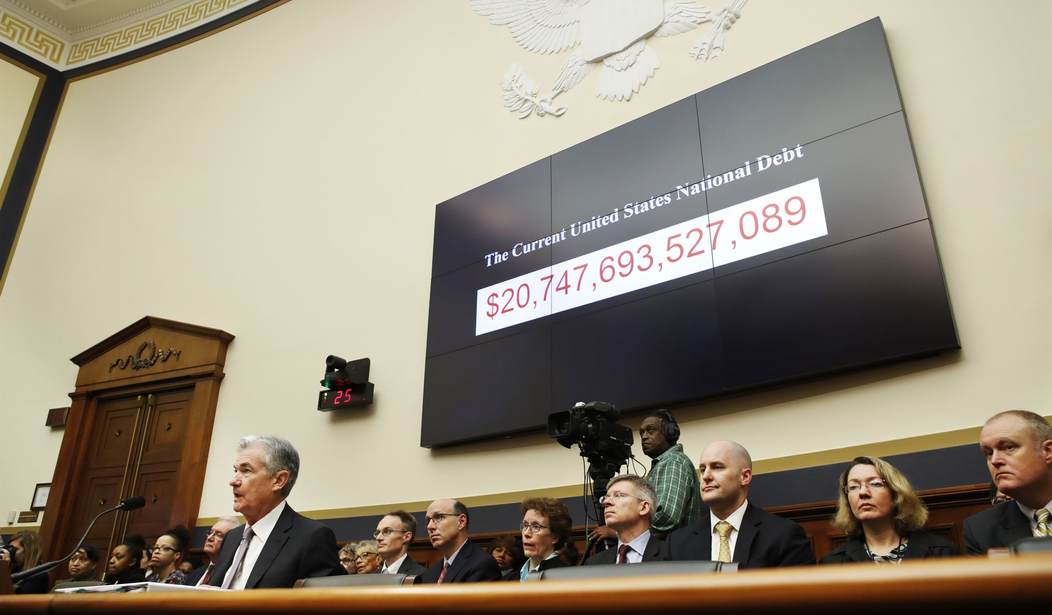It's the type of unsexy story that just glides past without much notice these days -- especially with so much excitement and speculation over historic summits, presidential self-pardons, and dramatic culture war skirmishes dominating headlines. But the federal government has dug our national finances into a frighteningly deep hole, having made tens of trillions of dollars' worth in unpaid-for promises (i.e. "unfunded liabilities"), on which tens of millions of people are relying. We've been sounding the alarm on this for years, over the course of two presidential administrations. The looming debt bomb is a predictable crisis, and yet virtually nothing is being done about it.
Republicans passed a number of budget resolutions during the Obama years that called for the implementation of Paul Ryan's desperately-needed Medicare reforms, but those had zero chance of becoming law. The Obama administration was committed to fiscal denialism and demagoguery, infamously responding to the bleak math with literally no plan to corral it. Then Donald Trump secured the GOP nomination and the presidency while pledging -- for political reasons -- not to touch the two biggest drivers of our long-term debt, discarding years of hard work Paul Ryan and his allies had undertaken to prove that pursuing entitlement reform was not a lethal third rail. Then, in February, both parties teamed up to pass an awful omnibus spending bill that blew through even the modest constraints the GOP opposition had secured during the Obama era. The US government's spending trajectory remains pointed inexorably and recklessly northward, with no fiscal responsibility in sight. And as of yesterday, we know that the unfunded liabilities problem is worse than ever:
BREAKING: Government: Medicare will become insolvent in 2026, three years earlier than expected, Social Security to follow in 2034.
— The Associated Press (@AP) June 5, 2018
Medicare will run out of money sooner than expected, and Social Security’s financial problems can’t be ignored either, the government said Tuesday in a sobering checkup on programs vital to the middle class. The report from program trustees says Medicare will become insolvent in 2026 — three years earlier than previously forecast. Its giant trust fund for inpatient care won’t be able to fully cover projected medical bills starting at that point. The report says Social Security will become insolvent in 2034...Unless lawmakers act, both programs face the prospect of being unable to cover the full cost of promised benefits. With Social Security that could mean sharply reduced payments for retirees, many of whom are already on tight budgets. The report said the total annual cost of Social Security is projected to exceed total annual income in 2018 for the first time since the Reagan era, meaning the program will have to tap into reserves. For Medicare, insolvency would mean that hospitals, nursing homes and other providers of medical care would be paid only part of their agreed-upon fees. Medicare is widely seen as a more difficult problem that goes beyond the growing number of baby boomers retiring.
Recommended
More details on the breathtaking scope of these challenges:
Its even worse:
— Brian Riedl (@Brian_Riedl) June 5, 2018
-- Social Security & Medicare face an $82 trillion cash deficit over next 30 years.
--By 2047, they would take in 5.9% of GDP and cost 16.3% of GDP.
--Stabilizing the debt without reforming these two programs would require eventual 34% VAT or 33% Payroll Tax. https://t.co/7b5GkvIvOW
Eighty-two trillion dollars. That's more than four times the size of US GDP. The cop-out "solutions" from both parties on this -- "economic growth!" (Republicans), "raise taxes on the wealthy!" (Democrats) -- are woefully, insultingly inadequate. These programs must be reformed to survive. That's a mathematical fact. Yet neither major party has the political appetite to do what it takes. One pretends to care, then runs up new bills and punts on the toughest calls when in power; the other doesn't even pretend to care, except as a means of attacking tax cuts. I'm not sure which is worse. The Examiner's Philip Klein offers this sobering perspective and context:
The U.S. is now closer to the insolvency of the Social Security than to the attacks of Sept. 11. Trustees for the retirement and disability program revealed on Tuesday that Social Security will no longer be able to meet its obligations to beneficiaries starting in in 2034, or 16 years from now — which is less time than has elapsed since terrorists slammed airplanes into the World Trade Center and the Pentagon in 2001. In 2005, President George W. Bush was dismissed as an alarmist for highlighting projections that the program would begin spending more money on benefits than it takes in starting in 2018 and that its "trust fund" would be depleted in 2042. In reality, it has been running annual deficits since 2010, and the insolvency date has moved up eight years...As the Social Security crisis keeps getting closer, the political parties are moving further away from doing anything about it...What's scary is that Social Security is relatively easy to fix when compared to Medicare, a program where the rising retirement population is interacting with growing healthcare costs. And the trustees now say that program is going to be insolvent in 2026 — or roughly the same time as we are from the passage of Obamacare.
Treaury Secretary Steve Mnuchen's quote on this state of affairs may be less atrocious than Tim Geithner's abdication, but it's still an example of classic DC delusion and avoidance: "The programs remain secure," he assured Americans before tacking on a euphemistic assurance that "long term issues persist." Calling that an understatement doesn't quite do it justice. At this stage, many millions of younger Americans are being legally compelled to pay into massive programs that will be depleted shells of their former selves -- or entirely insolvent -- by the time it's time to reap what they've contributed, as promised. This scheme is tantamount to willful generational robbery. There may still be time to move toward a more responsible model (while preserving the existing structure for those at or near retirement), but that clock is expiring even faster than government accountants had previously calculated. To the extent that liberals commented on these new projections at all, they mainly seized on them to decry Republicans' pro-growth tax reform law, and to renew their predictable demands for the wealthy to pay their "fair share." An example of the first talking point:
One reason why Medicare is on shakier financial ground: Trump's tax overhaul. https://t.co/wLvyngqTnU pic.twitter.com/7lQq6dS1Ix
— Bob Herman (@bobjherman) June 5, 2018
The truth is that Medicare has been on exceptionally shaky and unsustainable ground for years. "Trump's tax overhaul" is helping the US economy flourish, despite its deficit and debt implications, which I don't deny. But any attempt to pin the entitlement collapse on tax relief is dishonest sophistry. I'd add that even after the tax cuts, federal revenues (as a percentage of GDP) will remain slightly above the annual average of recent decades. This is a long-term spending problem that requires root-and-branch reform. As for "the rich" and "fair shares," we've already dealt with that myth on numerous occasions. Click those links for specifics, but here's the simplified gist:
The top 1% of earners pay roughly 40% of all federal income taxes. The top 20% pay 70% of ALL federal taxes. The “fair share” pablum is a partisan myth. https://t.co/Uy9cbxrhBk
— Guy Benson (@guypbenson) June 5, 2018
I'd also reiterate this point: "Democrats drone on about the importance of returning to the 'Clinton-era tax rates.' They never, ever discuss Clinton-era spending levels. President Clinton's FY 2000 budget called for $1.77 Trillion in total federal spending." Last year, the federal government spent $4 trillion. Furthermore, the notion that the government could tax its way out of this dilemma without absolutely clobbering the middle class and crushing the economy (it cannot) is dispelled by these numbers:
Just "tax the rich?"
— Brian Riedl (@Brian_Riedl) June 5, 2018
Here is the long-term tax rate that would be required for families earning $400k:
-- 78% to finance Social Security (90% counting state & FICA)
-- 190% to finance Social Security + Medicare (202% counting state & FICA)
Someone buy this group a calculator https://t.co/ogyMOXc9Cx
I'll leave you with this parting thought: The red ink described above is harrowing and daunting, for reasons that should be screamingly obvious. Please consider that a sizable contingent of the Democratic Party looks at these exact same numbers and concludes that we must expand Social Security and expand Medicare to cover more than 300 million people, at mind-blowing cost. These are dangerous, denialist fantasies, and should be treated as such: With fierce, almost existential, opposition.























Join the conversation as a VIP Member